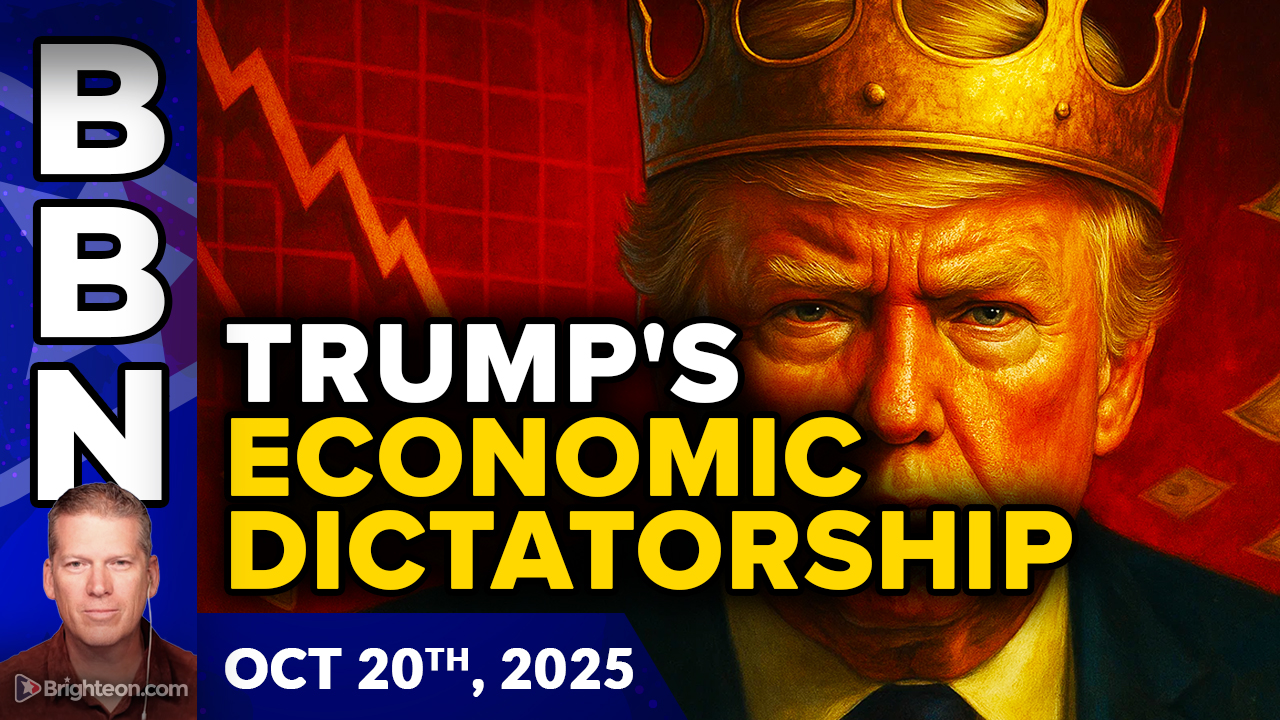Bitcoin was the LIFELINE TEN YEARS AGO to counter economic damage caused by governments and big banks
10/24/2025 / By Lance D Johnson

Imagine waking up in 2025 and realizing that the most reliable path to wealth—homeownership—has been systematically priced out of your reach. Now imagine the realization, that a decade earlier, a digital asset existed that could have secured your financial freedom, if only you hadn’t believed the gatekeepers of the economy who dismissed Bitcoin as a fringe, risky experiment.
This isn’t hypothetical. It’s the reality for millions of young Australians, Americans, and Westerners under 40 who watched Bitcoin climb from $400 to over $100,000 while they were told to trust the same institutions that inflated housing prices beyond reason. The question isn’t just about missed opportunities anymore. It’s about whether an entire generation will ever recover from a financial betrayal orchestrated by central banks, corrupt politicians, and a rigged real estate market—or if cryptocurrency, despite its risks, remains their only lifeline.
Now, as governments scramble to regulate crypto, the same forces that locked young people out of homeownership are positioning themselves to control the one asset that could set them free. The irony is brutal. The system that failed them now wants to dictate how they use their last escape route.
Key points:
- A decade of theft: Younger generations were sold the lie that student debt, low wages, and skyrocketing home prices were just “market realities”—while Bitcoin, dismissed as a gamble, surged 23,000% in the same period.
- The housing trap: Australia ranks as the sixth most expensive property market globally, with millennials and Gen Z now viewing crypto as their only shot at financial independence.
- Regulation as a double-edged sword: While proper oversight could legitimize crypto, history shows governments use “protections” to seize control—just as they did with fiat currency, stocks, and real estate.
- The surveillance trade-off: A staggering 33% of Gen Z would accept government surveillance in their homes, revealing a dangerous naivety about how financial control leads to totalitarian overreach.
- The Bitcoin awakening: Younger investors are shifting from stocks to crypto, but will they recognize the deeper game—where banks and states manipulate every asset class to keep them dependent?
How Big Banks and Big Government stole the dream
For decades, the script was simple: go to college, get a job, buy a house, retire comfortably. But somewhere between the 2008 financial crisis and the COVID-era money printing, the script was rewritten—without telling the actors. Central banks slashed interest rates to near-zero, inflating asset bubbles that only the already-wealthy could access. Wages stagnated while corporate landlords and BlackRock snapped up single-family homes to turn them into rental cash cows. The result? In Australia, 40% of under-35s now say their biggest financial regret isn’t splurging on avocado toast—it’s ignoring Bitcoin when it was cheaper than a used car.
The numbers don’t lie. In 2015, Bitcoin traded between $172 and $465. Today, it hovers around $107,000. A $1,000 investment then would be worth over $2.3 million now. Meanwhile, the median home price in Sydney has surged past $1.4 million, with wages failing to keep pace. The message to young people is clear: the traditional paths to wealth are closed. The only question left is whether they’ll let the system close the alternatives, too.
Swyftx’s survey reveals the desperation. Eighty percent of Australians under 50 regret their financial decisions over the past decade. Crypto isn’t just an investment for them; it’s a rebellion. “Housing unaffordability at this scale is a predicament other generations didn’t face,” a Swyftx spokesperson told Cointelegraph. “Crypto is seen as an opportunity to get ahead.” But here’s the catch: the same institutions that priced them out of homes are now moving to regulate—and potentially strangle—crypto. Australia’s Labor Party has already proposed folding crypto exchanges under existing financial laws. On the surface, this sounds like “protection.” In reality, it’s the first step toward co-opting the one asset young people still control.
The surveillance state’s endgame
There’s a disturbing paradox in the data. While younger generations flock to crypto as a hedge against a broken system, a third of Gen Z would willingly invite government surveillance into their homes—ostensibly to “monitor domestic violence.” This isn’t just ignorance; it’s a failure to recognize how financial control morphs into total control. History shows that once governments gain a foothold in monitoring assets, they rarely stop there.
Look at Canada’s 2022 trucker protests, where Prime Minister Justin Trudeau froze protesters’ bank accounts without due process. Or the U.S. IRS’s push to track transactions over $600, a move that would give the state real-time visibility into every citizen’s spending. Crypto was supposed to be the exit ramp from this kind of overreach. But if young investors don’t wake up to the patterns—how fiat currency became a tool of debt enslavement, how stocks are manipulated by hedge funds, how real estate is hoarded by institutional buyers—they’ll watch crypto suffer the same fate.
The warning signs are already here. The Biden administration’s 2021 infrastructure bill included crypto tax reporting requirements so onerous that even The Wall Street Journal called them unworkable. The European Union’s MiCA regulations, while less draconian, still impose KYC (Know Your Customer) rules that erode privacy. And let’s not forget the World Economic Forum’s gleeful predictions of a cashless society where “you will own nothing and be happy.” Crypto’s original promise was decentralization. But if Gen Z trades financial freedom for the false security of government “protections,” they’ll repeat the same mistakes their parents made—trusting the very system that’s fleecing them.
The Bitcoin regulation reckoning
The shift is happening. Swyftx’s data shows that within two years, younger Australians may be just as likely to buy Bitcoin as traditional stocks. But momentum depends on two things: regulation and education. The first is a double-edged sword. Yes, clear rules could bring institutional money into crypto, stabilizing prices and reducing volatility. But as we’ve seen with every other asset class, regulation is a Trojan horse. Banks didn’t enter the crypto space out of altruism; they did it to co-opt the competition. Morgan Stanley now offers Bitcoin exposure to its wealthy clients—not because it believes in decentralization, but because it wants to profit from the revolution it once dismissed.
The second factor—education—is where the battle will be won or lost. Younger generations understand the basics of crypto, but do they grasp the deeper game? Do they know that the Federal Reserve’s money-printing binges devalue their savings? Do they realize that the same politicians pushing “affordable housing” policies are often the ones taking donations from BlackRock and real estate lobbyists? Do they see the connection between central bank digital currencies (CBDCs) and China’s social credit system, where dissenters can have their funds frozen with a keystroke?
The answers will determine whether crypto remains a tool of liberation or becomes just another cog in the machine. Right now, the signs are mixed. On one hand, you have Gen Z traders making nearly $10,000 in profits on average—proof that they’re learning to navigate the space. On the other, you have a generation that’s disturbingly comfortable with surveillance, seemingly unaware that financial privacy and personal freedom are inseparable.
The housing crisis wasn’t an accident. It was the result of deliberate policies. Crypto offered an escape hatch, but the window is closing. Governments and banks are circling, ready to turn Bitcoin into just another regulated, taxed, and surveilled asset. The question for millennials and Gen Z is no longer about whether to invest. It’s about whether they’ll fight to keep crypto free—or hand the keys to the same institutions that stole their future in the first place.
Sources include:
Submit a correction >>
Tagged Under:
asset inflation, Australian economy, Bitcoin regret, central bank fraud, crypto freedom, decentralized finance, digital assets, economic betrayal, fiat collapse, financial rebellion, financial surveillance, Gen Z naivety, generational theft, government control, housing crisis, investment shift, real estate bubble, regulatory capture, wage stagnation, wealth transfer
This article may contain statements that reflect the opinion of the author
RECENT NEWS & ARTICLES
COPYRIGHT © 2020 Debtbomb.news
All content posted on this site is protected under Free Speech. Debtbomb.news is not responsible for content written by contributing authors. The information on this site is provided for educational and entertainment purposes only. It is not intended as a substitute for professional advice of any kind. Debtbomb.news assumes no responsibility for the use or misuse of this material. All trademarks, registered trademarks and service marks mentioned on this site are the property of their respective owners.




















